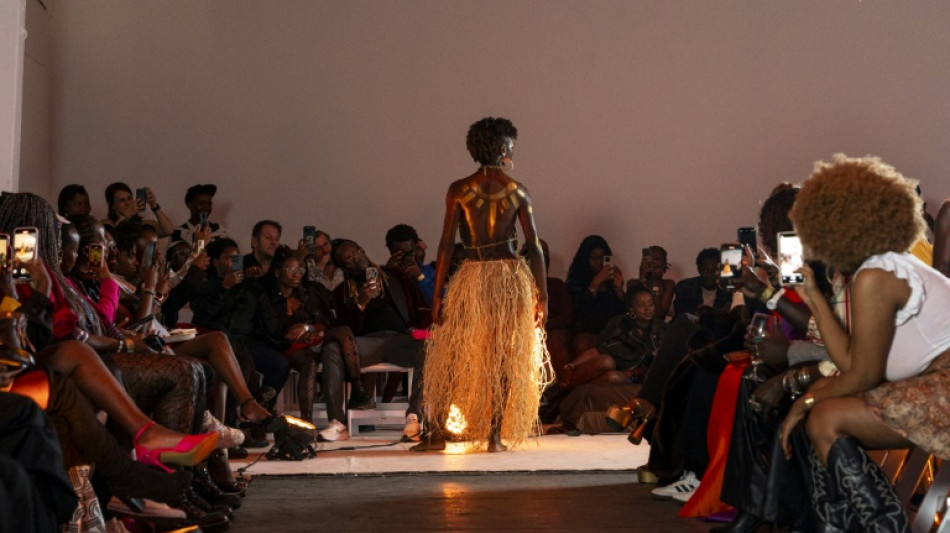
Kenyan LGBTQ community vogues despite threat of repressive law

Before a cheering audience, a man opened the ball in Nairobi with acrobatic moves to electronic rhythms -- a celebration of queer resistance from a Kenyan LGBT community feeling threatened by new legislation.
"Balls", where participants can vogue and catwalk with full freedom, were created by the Black and Latino gay and transgender community in the United States in the 1960s.
They reached Kenya in 2022, but remain hidden, held by the LGBTQ+ community behind closed doors -- yet they remain glorious explosions of colour, music and glamour.
"The vibe here is enchanting," said one participant, who like all attendees AFP is not naming for security reasons.
"It's so comfortable when you get to be around people who are like you."
Organisers said such events -- and tolerance -- were growing in Kenya, a predominantly conservative Christian nation that remains hostile to their community, especially outside the capital Nairobi.
Same-sex relationships are officially punishable by 14 years imprisonment under a colonial-era law, though it is rarely enforced.
And even in the country's biggest city, many of the participants juggle a double life.
"Tomorrow you have to go and act like you're someone else," said Kat, 25, her face hidden behind a crochet veil.
"It does weigh on me," she said.
One of the organisers, a 26-year-old man, wrapped in a hooded kimono and wearing high heels, said that despite the freedoms offered on such nights, the situation for the LGBTQ+ community was dire.
"Our government is trying to pass this bill that is threatening literally our entire existence," he said.
Known as the "Protection of the Family" bill, the legislation could be considered later this year by parliament.
According to the latest version seen by AFP, it proposes sentences of up to 30 years in prison for same-sex relations, and calls for them to be reported.
- 'Deeply rooted' -
MP Peter Kaluma, who has urged parliament to pass the bill, recently participated in the "Pan-African Conference on Family Values" in Nairobi.
He told a crowd the "LGBT+ perversion... [is] deeply rooted in our societies," and called for a "morally sound, socially secure, and politically sovereign" future.
Organised by evangelical groups claiming to defend the continent's "traditional" values, the event saw Western speakers push ultra-conservative messages.
Such calls have made strides in Kenya thanks to foreign backers' deep pockets, according to Ivy Werimba of the LGBTQ+ advocacy organisation Galck+.
Between 2008 and 2020, US Christian groups -- at least one of which spoke at the conference -- have sent more than $280 million abroad, according to an OpenDemocracy investigation.
Their impact was "decisive" in achieving neighbouring Uganda's Anti-Homosexuality Act in 2023, according to Human Rights Watch.
The law is among the most repressive in the world with harsh sentences for same-sex relations or "promoting" homosexuality, including the death penalty in some cases.
- 'Happy Pride' -
By contrast, at the Cosmopolitan Affirming Church, two rainbow banners emblazoned 'Happy Pride' streamed down the walls of the prayer space, a colourful rebuttal to the open hostility preached elsewhere.
The church believes God's pronoun is "she" and sexuality is not taboo, and has been welcoming believers each Sunday for the past decade.
"People have gone to spaces that have rejected them very badly," said non-binary pastor Caroline Omolo.
The 48-year-old welcomes worshippers into a place "that allows them to fully express themselves, with all their differences, with all their queerness".
The service offers a different reading of the Bible, with congregants finding acceptance where once they were rejected.
"I believed God made me queer so He could take me to hell," said a 25-year-old member, but Omolo's preaching "changed my perspective".
The church, which numbers just over 100 from its initial congregation of just seven, is now warning members about the potential of the proposed Family Protection Bill.
Omolo insists that in the future the world will recognise and celebrate their community.
In the meantime, as the young designer at the ball put it: "We are shapers of the culture and you cannot erase us."
F.Harris--TNT